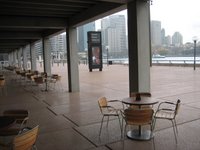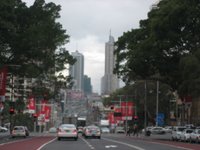Saturday Nite
Saturday was spend at Gold Coast – Party. The word itself brought to mind noisy, half - naked revellers; it suggested the kind of empty frivolity and moral laxity of which I had been brought up to disapprove. It was my going away; I don’t know when I will see those faces again. Driving back Sunday afternoon, still hung-over and starving couldn’t help but think ‘if only’. Somewhere, in me with the ‘detachment is the key’ formula – kept thinking, if only, I had behaved, if only, I had realised the important things in life before loosing them – maybe, maybe – Miss West would still have been in my life. Excuses for the self-pitying bastard. Heading to
My old French friend – Sebastian, had once mentioned how
In the months and years, since I met Miss West following the first evening, I was to see her in every mood and posture, in every kind of dress and at different times of the day; such rapt gazing as mine would leave a wealth of memorable images in my mind. But it is the picture of her sitting up very straight on her balcony, abstractedly plucking nibbles, the light from the city lights bathing her clear unblemished face in a golden glow that has stayed most vividly with me, and is the central force that illuminates her in my memory.
As I prepare myself to leave this city, a thin crimson – edged mist hangs over the river when I walk out of the house. The alleys leading to the main road is empty, the houses sunk in a blue haze, still untouched by the sun, which had already begun tentatively to probe the facades of the houses lining the river. I found my paradise and despair in this city. Morals, beliefs, principles were formed, tested, broken here. Mates made and lost, with Miss West beside me – I had a sense of serenity. Life, couldn’t touch me – was impregnable. Now I stare at the emptiness, isn’t this the déjà vu I have already experienced when I left








